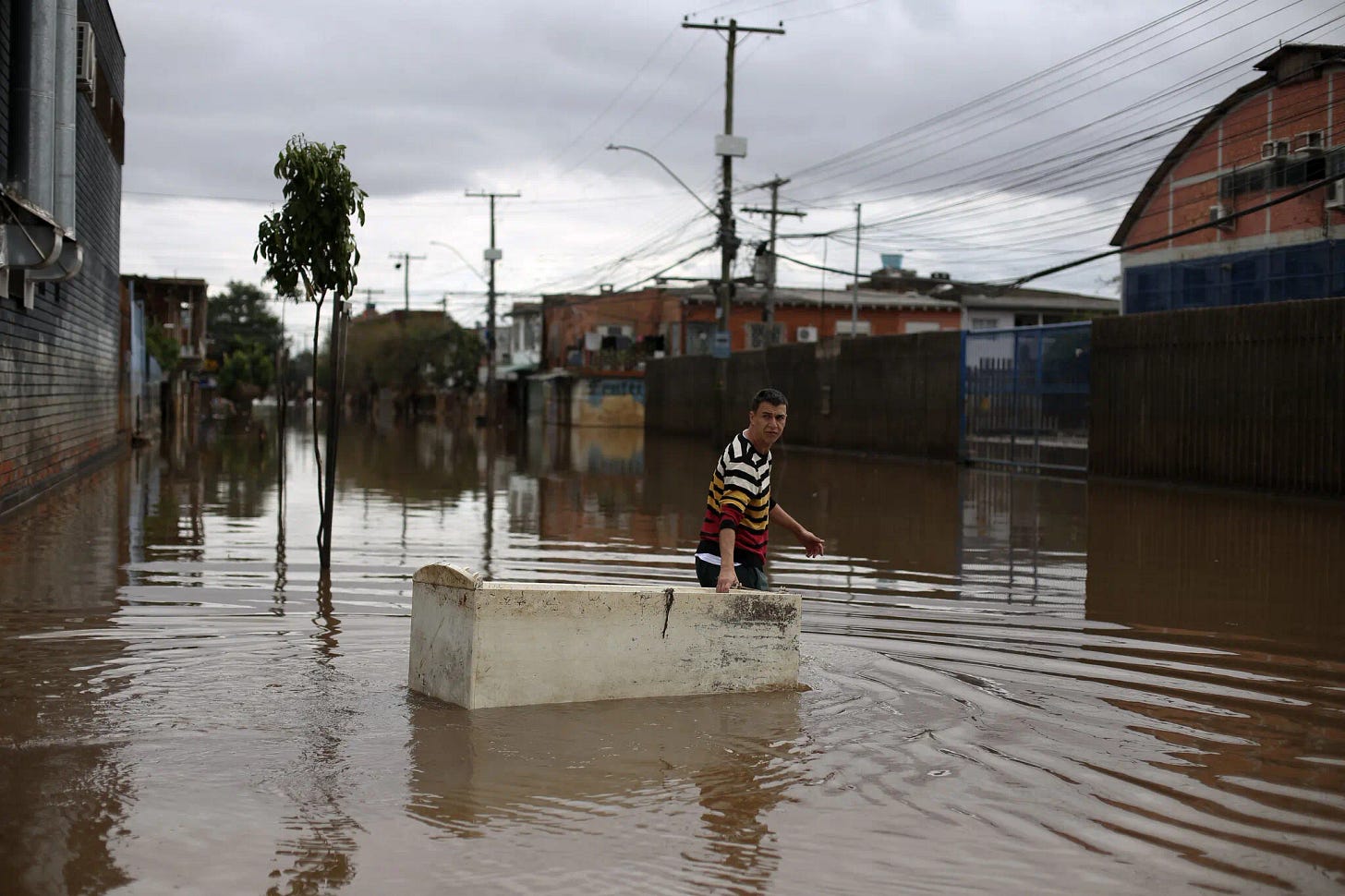
Human-caused climate change doubled the chance that southern Brazil would suffer from intense rains like those that caused devastation starting in late April, according to a new scientific study by the World Weather Attribution group.
The team of international scientists concludes that catastrophic flooding like this -- 169 people were killed, 80,000 displaced and over a million people left without essential services -- will become more common in the future if there is not a sharp reduction in the greenhouse gas emissions heating the planet.
Years of scientific studies have warned that climate change would lead to more intense rainfall and flooding in southern Brazil. But politicians still struggle to accept and act on future climate risks, Natalie Unterstell, the head of Talanoa, a climate policy research institute in Brazil, told NYT.
U.S. could shut down border
U.S. President Joe Biden is expected to sign an executive order today that would permit the government to temporarily seal the country’s border with Mexico to migrants when crossing surge. The move would suspend longtime protections for asylum seekers in the United States, reports the New York Times.
The restrictions could be implemented once the number of illegal crossings exceeds 2,500 in a day. Since 3,500 people are crossing per day now, the order could kick in immediately. Migrants would be returned to their home countries or Mexico and be ineligible for asylum consideration once the limit is surpassed, reports the Washington Post.
Biden is expected to announce the measure today in the White House at an event to which border mayors have been invited, reports the Associated Press.
The move, which will almost certainly be challenged in court, reflects the intense political pressure Biden is under on migration issues in an electoral year: “The order would be the most restrictive border policy instituted by Mr. Biden, or any other modern Democrat, and echoes an effort in 2018 by President Donald J. Trump to curb migration that Democrats assailed and federal courts blocked.”
Mexico
Claudia Sheinbuam not only won the presidency by a landslide 30 points – the highest percentage in Mexican democratic history – but the ruling Morena party appears to have won seven of the nine governorships in play, including Mexico City, and has supermajorities in at least 22 of 32 state legislatures. Preliminary results put Sheinbaum on track to have supermajorities within reach in both chambers of congress, which could enable her to carry out controversial constitutional reforms championed by her mentor, reports the New York Times.
President Andrés Manuel López Obrador presented a wide-ranging package of constitutional reform, including pension reform but also outlawing animal abuse, as well as banning fracking and the sale of vapes. The most controversial would be a reform to elect supreme court justices by popular vote, reports the Guardian.
Sheinbaum’s landslide victory “represents a clear mandate and a hard-to-swallow reality check for many who have yet to understand the desires and aspirations of the many social groups that felt disregarded by previous governments. Trust in government needs to be rebuilt and polarization must be overcome,” writes Vanessa Rubio in Americas Quarterly.
“Given Sheinbaum’s scientific background, she may prioritize a notable shift toward sustainable development and environmental protection. This could lead to bilateral and multilateral agreements to speed the development and deployment of green technologies. However, should Trump be re-elected in the U.S., such policies might encounter resistance in Washington, especially if they clash with Trump’s deregulation agenda,” according to Brenda Estefan, also in Americas Quarterly.
AMLO says he will retire from public life completely following his final day in office on Sept. 30 — some analysts believe the wildly popular leader will continue to exert influence behind the scenes, reports the New York Times.
Regional
At least a dozen women have won executive elections in Latin America, a fact that spotlights how some of the region’s democracies “that emerged from the ashes of authoritarian rule have proven exceptionally open to tearing down barriers to political representation,” according to the New York Times.
“Jennifer Piscopo, a professor of gender and politics at Royal Holloway, a college at the University of London, said that women who had become president in Latin America generally followed a pattern of being nominated by incumbent parties already enjoying high levels of voter support.” – New York Times
“Smugglers transporting illicit drugs, arms, and gold are increasingly using commercial and cargo flights to move shipments, according to data on the evolution of air routes following the COVID-19 pandemic,” reports InSight Crime.
Venezuela
About 25% of Venezuelans are thinking about migrating, primarily for economic reasons, according to a Delphos poll. Of these, about half said an opposition victory in the July 28 elections would make them stay, and about the same number said economic improvements would do the same. (Associated Press)
Peru
Political turbulence has dragged down Peru’s economic performance in the past eight years, but though democracy remains on shaky ground, global economic conditions have improved, argues former finance minister Alfredo Thorne in Americas Quarterly.
Culture Corner
“Margot Benacerraf, a critically acclaimed Venezuelan documentary filmmaker whose hypnotic “Araya,” a visual tone poem chronicling the daily lives of salt workers on an austere peninsula on her country’s coast, shared the critics’ prize at the 1959 Cannes Film Festival, died on Wednesday in Caracas. She was 97.” – New York Times




